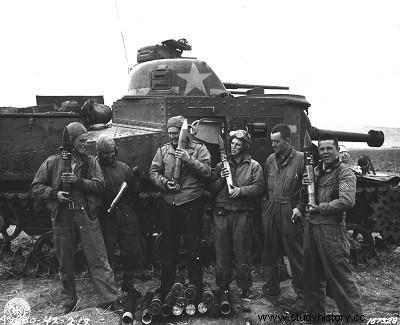
It was then that the Germans committed an incredible mistake, which remains partly unexplained to this day. Brigadier General E.E. Cass, commanding the 11th British Brigade, had decided on a new attempt (without much hope, but it had to be...). The next day he committed his last fresh reserves, the 1st battalion of East Surrey Regiment, to attack an abandoned position... The Germans were gone! In two hours the engineers had thrown a bridge over the Medjerda and, in the early hours of November 27, the English had advanced 25 kilometers to the small town of Tebourba, Tunis was only 35 kilometers away.
What had happened to the three battalions of the 5th parachute regiment of Lieutenant-Colonel Koch and their tanks, to have thus abandoned their positions in front of the 11th brigade? It is probable that the local commander of the Axis forces, General Walter Nerhing, of the 90th corps, did not realize the slowness of the concentration of the Anglo-American forces (the first American tanks did not come into line until the 2 December).
His flanks, like those of the British, were exposed, and at Medjez-el-Bab his forces seemed to him dangerously isolated. This feeling was strongly accentuated by the presence of the Blade Force less than 50 kilometers from Tunis, with Djedeida, the key position of the logistics system of its forces, at the mercy of enemy armored raids.
By this action, the commander of the 1st battalion of the 1st American armored regiment had not only been able to destroy 37 fighters and bombers of inestimable value, grounded by rain and mud, he had also caused a generalized crisis in the German defence. The Blade Force, brilliantly commanded by Colonel Richard A. Hull of 17121` Lancers (now Field Marshal Sir Richard Hull and former Chief of the Defense Staff) was also beginning to exert strong pressure on his center. Nehring decided that a pause was essential, time to muster an organized force for the counter-offensive.
In this sector, at the forefront of the entire advance, was the 1" parachute battalion of Lieutenant-Colonel James Hill which, after a successful parachute drop on Souk-elArba on November 16, had reached Beja, 65 kilometers to the northeast, and controlled the whole region on both sides of the Beja road -Sidi Nisr where he led a series of daring ambushes and raids.
The Axis troops were no longer accustomed to this commando warfare, considered contrary to the customs of war and akin to outright assassination:Lieutenant Mellor's patrol having pushed north to Mateur, the officer ventured alone into the town to kill any isolated enemy he might encounter on his way.
Lieutenant Wandless entered a German outpost alone, stabbed an officer and threw a bomb in the mess room. All the diners were killed... Executing to the letter the laconic order received from his battalion commander, "Blow up, blow up everything, and let it blow up...", Lieutenant Coxen made himself master of an important advanced position, known to posterity as Coxen's Farm.
As for Cleasby-Thompson, he ambushed six German armored vehicles and reconnaissance vehicles, in destroyed five and captured the last intact.
Lieutenant-Colonel Hill, having seen three German tanks, took it into his head to demand their surrender by dealing furious blows on their armor with the long cane who never left him. The first two
crews surrendered, but the third opened fire at close range on him and another officer, Captain Whitelock. The paratroopers neutralized him with bayonets, without giving quarter.
